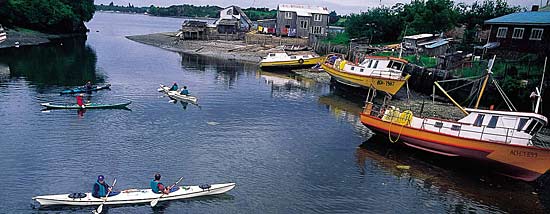Chiloe Island Sea Kayaking
|
|
Immerse yourself in the fascinating, cultural experience of Chiloe Island as we glide silently through the mysterious byways of this archipelago. Our sturdy kayaks emulate the spirit of the fragile dalcas; in which the natives traveled many centuries ago. Today there still vestiges of this original Araucanian way of life, in harmonious combination with the influences of German immigrants in the late 1800s and of modern-day Chile.
|
DAY 1 ANCUD - PUÑIHUIL - DUHATAO - CASTRO
Reception at the bus terminal of Ancud, then we will drive west to visit the place of Puñihuil in the Pacific side of the main island. This is a group of islands that serve as breeding habitat for Magellanic and Humboldt Penguins as well as many other marine birds. Visit to the colony by zodiacs. After our pic-nic lunch in the beautiful cove of Duhatao we will hike along this wild coast and reach spectacular vista point. Drive to Castro in the interior sea of the archipelago and arrival to a picturesque stilt house hostel. Dinner at your own. (L) DAY 2 CASTRO - SEA KAYAK DALCAHUE CHANNEL - TENAUN - MECHUQUE Morning transfer to the sea kayaking center near the cultural port of Dalcahue. Full day sea kayaking paddling in Dalcahue channel, on the way we see great numbers of local seabirds including black-necked swans, three kinds of seagulls, oyster catchers, grebes. Then we continue across the Channel to Quinchao Island. Pic-nic lunch. For the rest of the afternoon, we visit various picturesque locations along the channel, until we finally return to the Sea Kayak center. In the evening we drive to the picturesque fishing village of Tenaun with its lovely church. Here we will catch a traditional motorized vessel and corss to the stilt house village of Mechuque and our sea front familiar hostel in the afternoon. Dinner and lodging at the hostel.(B,L,D). DAY 3 MECHUQUE - TAUCOLON VOIGUE Today we start early for a full day of sea kayaking among the waterways and islands of Mechuque, Voigue, Añihue and Taucolon, visiting villages and churches as we go. We pay special attention to the traditional culture of this area, celebrated in the songs and dances of Chilean folklore; women diging for clams at the low tide, a fisherman fixinff his wooden boat. In particular, we watch for palafito stilt houses with brightly colored fishing boats tied up in their "basements". In the afternoon, we get back to Mechuque with time to walk around this surreal village before dinner. Dinner and lodging in our family house (B,L,D). DAY 4 MECHUQUE - AÑIHUE - MECHUQUE Morning paddle to Añihue island and its many water trails and beautiful sea lagoons. We will enjoy our pic nic lunch in the lovely place of Chuchuquen where we can appreciate in the distance part of the Andean range and volcanoes. In the afternnon, we get bacj to Mechuque in time for hike to spectacular vista points. Dinner and lodging in our family house. (B, L,D) DAY 5 MECHUQUE - TENAUN - COLO - SAN JUAN - DALCAHUE - CASTRO After breakfast we cross back to Tenaun in our vessel and drive through a beautiful coastal road in the interior sea of the main island, visiting cultural highlights and villages as Colo with its special wooden church, San Juan with its famous traditional shipyard and Dalcahue with its handicraft market. We get into Castro early in the afternoon in order tu catch the bus back to Puerto Montt or Puerto Varas. (B,L) |
Departures from December to March, on request 2019-2020 PRICE PER PERSON: US$1240 minimum 3 participants.- Based on dbl occupancy. INCLUDES -
NOT INCLUDED - Any type of insurance./ Gratuities and personal extras as communication cost, laundry, meals , drinks and transportation out of program and other personal items. DEGREE OF DIFFICULTY AND PHYSICAL CONDITIONING: The trip is not especially rigorous and requires no prior experience with kayaks. Must know how to swim and be in reasonably good physical condition. A positive attitude towards open-air activities is very important. These are trips for the person who enjoys participative tourism in a natural setting, understanding that during our trip we may encounter variable weather and tidal conditions that require us to adapt the sequence of the itinerary. |


